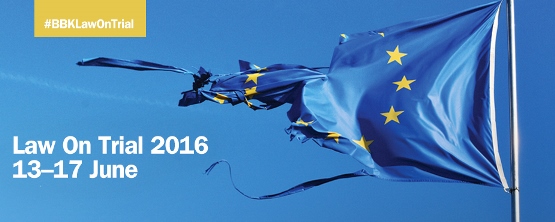This post was contributed by Michelle Everson, Professor of Law at Birkbeck. She has written widely on European Economic and Constitutional Law and has advised the European Commission, the European Parliament and the European Central Bank on matters of European Law.
Professor Everson is hosting a week long debate on ‘Europe at the Crossroads’ at Birkbeck (13-17 June). For details and to book your place, please visit the ‘European Law on Trial’ website.
Every day this week, Professor Everson writes for Birkbeck Comments, offering up her thoughts, opinions, and analysis on the EU referendum. Read part 1, part 2 and part 3 of her blog.

More order, but less Europe
My vote for Europe is not a vote for its current malaise of totalising economic rationalism, for its political, legal and intellectual abdication, or for its heedlessness for the dispossessed of Athens or Lisbon. It is a vote for the European Union qua its status as institution; an institution unique within a global mass of bilateral trade agreements that is bestridden, at the point of its judicial application, by the disembedded economic thinking of a culturally-denuded World Trade Organisation. However imperfectly, the EU, qua institution, is open to the voices of cultural and social self-determination and also to the voices of economic value that are not simply disregarded, but also traduced within dominant economic rationality. Hobbes is very long dead: In their rush to resurrect the dusty fairy tale of national sovereignty, Brexit campaigners, would have us abdicate at the global level, all potential for the re-establishment of political and social self-determination over the economy. We, by contrast, should take our fight for the soul of economic liberalism to Europe.
Norman Tebbit tells an interesting tale of his own disenchantment with the European project. As an airline pilot, working together with colleagues from other European nations in order to ensure airline safety, he was seized by the commonality of his lived experience with the European group, excited and liberated by the ease of communication between pilot-experts who sought to solve common technical problems. Only later did he worry that this technocratic group, in all of its shared enthusiasm, had become divorced from the masses still locked in more generalist national cultural discourse. To this I answer, yes, you are right ‘Norman’ (I’m from Chingford, I can), but only insofar as you are utterly wrong. In academic jargon, ‘epistemic communities’ of shared expertise are major culprits within democracy-denuding technocratisation processes, as well as within the near collapse of the global financial system: why did no one see it coming? Yet, cross-European meetings of like minds can also produce visionary rationalities; and I count myself blessed to be able to sometimes join the first generations of Eurocrats in toasts to their retirements. But, also in the medium of day-to-day, Ryanair-facilitated movement around Europe, in the Europeanisation of media discourse (German television transmitted the Farage-Cameron debate live and in full), in the Europeanisation of consumer, environmentalist, and economic pressure groups, the far broader conversation amongst European peoples can be heard, and is similarly exciting for its commonalities, rather than made discordant by its differences.
What do the peoples of Europe want? They want what we all want: economic and political autonomy, welfare and an effective means of their realisation. In a globalised age that is as unsettling as it is exciting, people want an order of opportunity and of security; and therein lies the common ‘European’ cause for those of the left and of the right. Here, we can identify the joint project for those with tradition and for those who wish to break free from their own cultural confines, the shared programme for those who wish to make use of their new opportunities and for those who prefer their own four stone walls. Yet, this want will never be satisfied, this order will never be created, where we continue to sacrifice ourselves to the totalising and socially-disembedding powers of a dominant economic rationality that is as socially-amoral as it is delusional.
By contrast, our first sacrificial victim in the effort to save economic liberalism within Europe, or to re-establish civilised EU order, must be the notion of economic efficiency, the founding myth of bastardised capitalism. Who on the streets of Athens believes that the unbearable pain of insecurity, of myriad ruined, even curtailed lives can in some way be made good in the maybe never-to-be fulfilled promise of future riches? Also, and perhaps more significantly so, what price the economic opportunities of the farmer or the supplier forced out of business by the price-cutting imperatives of ‘perfectly-efficient’ competition between ever more fast concentrations of economic power? The second sacrifice follows from the first, and for the foreseeable future at least must be given in a commitment to less rather than more Europe.

Professor Michelle Everson
Certainly, in European economic constitutionalist mode we can create circumscribed rights of cross-border economic opportunity and can similarly seek to reverse the sad surrender of a once economically-decentralising European competition policy to the efficiency demands of the globally-dominant Chicago School of economics. Yet, by the same ordered token, where the primary locus of social, cultural and emotional attachment remains local, regional or national we must curtail European regulatory impulses, however attractive they might occasionally appear. The complex of ordo-liberal, (Christian) corporatist and social-democratic interests that still, to a certain extent, defines life in Bochum would go down like a lead balloon in Birmingham. Vice versa: the National Health Service, the one major survivor of Britain’s post-war universalist welfare tradition is still met with as much incomprehension in continental Europe as it is in the United States. It is certainly possible that, with time, Europe will find its own way to cultural unity and will embed a European economy within a European society.
In the meantime, however, in the manner of European federalism, this is all just a very pretty dream. The remnants of our national economic traditions left to us are perhaps sometimes irritatingly quaint, but they are still the greatest expression of ‘independent state action in a framework of respect for the economic and political autonomy of citizens,’ and we must all defend them determinedly within the institutions of the European Union, within its law, within its Parliament and within its source of executive competence (the European Council).
Law on Trial 2016: The European Union at the Crossroads, runs at Birkbeck from Monday 13 to Friday 17 June. Book a free place here.
Listen to Professor Everson on the topic of the EU referendum in the latest edition of Birkbeck Voices
This post represents the views of the author and not those of Birkbeck
Find out more
